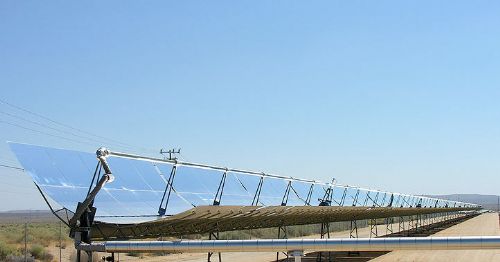
Solar thermal technology is a proven way of harnessing the sun’s energy to provide heat for both domestic and commercial uses. It can provide financial savings, a 20 year income and reduce carbon emissions for a range of businesses.
The technology has been around for a long time with solar hot water systems installed in the 1960’s still working today. The idea is very simple.
A collector, effectively a black radiator in a glass box, is faced towards the sun and used to heat a fluid, which is then pumped to a heat battery, usually in the form of a water tank, where the heat is removed from the fluid and stored.
Useful heat is then extracted from the heat store when it is required and passed through pipes and coils to where the heat is needed. An example of this should be familiar to most people as a coil in a domestic hot water cylinder.
The ability to store the captured heat makes solar thermal systems very efficient as the heat collected is available at any time, not just in the day or at the moment the sun is shining. All the heat collected can then be used so none is wasted.
Modern solar collectors are built with high tech glass and absorbtion coatings so that they are highly efficient, with some collected converting 85% of all the sunlight on them to useable heat. They are built and tested to all the weather conditions we find in the UK. The cylinders used are very well insulated and so would offer savings in their own right regardless of the solar input.
What in it for my business?
By displacing some of the water heating load from usual forms of energy such as oil and gas, a solar thermal installation will save money on fuel bills. It will also reduce the carbon emissions associated with burning fossil fuels.
The type of fuel you are on will affect the savings. Cheaper fuel sources such as mains gas will receive a lower return through than those businesses on oil or electrical heating.
Renewable Heat Incentive
In some cases the payback from fuel savings after installing a solar thermal system will provide a reason to go solar on their own, but in order to encourage take up of renewable technologies the government have introduced an incentive scheme for businesses to generate and use heat from renewable sources.
The Renewable Heat Incentive (RHI) pays an amount for each unit of thermal energy generated. The payment varies depending on the heating technology used. The current tariff for solar thermal is 8.9p/kWh. This means that alongside the fuel savings from using the sun to generate heat you get paid. This payment along with the fuel savings makes the payback time of most commercial Solar Thermal system between 5 and 10years after which the RHI becomes a source of income.
The RHI is marked to increase with RPI year on year
Solar thermal systems are particularly suited to business that use a lot of hot water, either through facilities for customers or employees, or for processes such as washing or large volume water heating such as swimming pools.
Benefits
Agriculture can benefit hugely from solar energy systems. Whether is it providing hot water for showers for seasonal staff or reducing the heating requirement for disinfection wash downs in dairies and milking parlours.
The water heater in Milking parlours that is used to provide 85 degree water to wash down the milking equipment is usually powered by a cheap rate night time tariff. Preheating the water going into the tank with solar energy will instantly reduce the required electricity to heat the water.
A simple installation of a solar thermal system with a new cylinder in line with the existing tank for a small to medium sized milking parlour would cost around £8-9000. The savings from electricity combined with the RHI income would ensure the system payback time was less than 10 years. The savings of £800+ a year would then continue to increase with inflation and fuel prices.
Finding an installation company
Due to the introduction of the RHI solar thermal is becoming a ’hot topic’. Many HVAC (heating, ventilation and cooling) engineers are up skilling to be able to deal with renewable technologies. Companies that install solar PV are also looking to enter the marketplace.
Domestic Solar thermal received a bad press in recent years with high pressure sales being used and badly designed systems being installed. The introduction of the Microgeneration Certification Scheme (MCS) has helped to remove the worst offenders from the marketplace.
